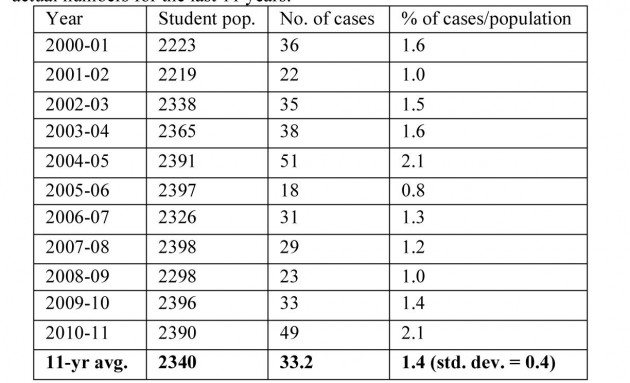
Thank you for addressing plagiarism in the Sept. 20 editorial. We would like to add some clarifying discussion and data. Over the last 11 years, the number of academic integrity cases has varied from 18-51 (avg. = 33), or 0.8-2.1% per student population. Though last year's increase is noticeable, there is no long-term predictable trend, except that 98-99% of DePauw students are not involved in an academic integrity case.
Is all dishonesty recognized and caught? No, but when it is, our policy, procedure, and purposes are clear (and easily found: Google "DePauw" and "academic integrity" / "plagiarism"). We introduce students repeatedly to proper practices, starting in their First-Year Seminar with Charles Lipson's book, Doing Honest Work in College, which explains why we cannot present someone else's work, words, or ideas as our own. First, it is intellectual theft (using technology and the Internet for research does not change our responsibilities). Second, scholars must be responsible for their ideas, discoveries, and statements. To debate and discuss, we must admit our contributions, and acknowledge those of others. Citing sources and evidence traces the trails of inquiry and conversation that comprise our shared intellectual heritage. It is "how we know what we know."
The editorial rightly recognizes that "copy-pasting" and "not citing and using someone else's ideas as your own" are "clear no-nos." But this is undercut by: "we often forget what we pulled from the internet and what we conceived ourselves. We sometimes forget to cite facts and figures…" Forgetfulness and carelessness are not valid excuses; it is better to cultivate habits of diligence and high standards. Talk to your professors to help avoid mistakes.
Faculty members want to be educators, not cops, and the process is firstly about teaching, and secondarily about enforcement. It's also a partnership: the review committee includes both students and faculty members. That partnership trusts that we hold ourselves—and each other—accountable for ideals of fairness and responsibility. Let's aim for those principles at DePauw.
Pedar Foss, dean of academic life
Carrie Klaus, assistant dean of academic life
